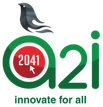National Portal
Create a harmonized system of public websites that reduce the hassle, time and costs incurred by citizens in accessing and availing government information and services.
National Web Portal Framework
Border Guard of Bangladesh once rescued a mentally imbalanced person from a border area of Satkhira district. The rescued one could only mention names of two places ‘Jessore district’ and ‘Sreedharpur union’. A Digital Center entrepreneur Mr. Raju of Satkhira district looked into the Nation web Portal and found the contact information of a Digital Centre entrepreneur of Sreedharpur union. He phoned him to know if he was aware of any such missing person from his locality. Soon the Sreedharpur Digital Centre entrepreneur gathered information and found out that a mentally imbalanced person who came out of jail had been missing from his area for some time. Thanks to the Nation web portal which has connected thousands of offices in one framework that such a quick flow of information has become a reality.

Empowering citizens’, particularly the underserved
In the backwaters of the rural areas of Bogra in Bangladesh, young Rahim stood confused between paying a hefty amount to an “immigration broker” for migrating to the dreamland of Malaysia, and leaving his hopes for a bright future ahead and joining his poor farmer father in cultivating others’ lands for a living. One day, a big brother from the neighborhood, took him to a nearby UDC and showed him a website. Starting from information about the application for migration to Malaysia to applying for government jobs, this portal had all the information he needs! He no longer has to run after dubious brokers for the information and the opportunities he needs. He has finally found his Midas Touch!
Impact of the National Portal
While a typical villager had to travel to the district government office about 40km away multiple times to get a certified copy of land records, she can now apply for it online and receive doorstep delivery of the document. Thus reducing the time from 30 days to 16 days, cost from USD 3.3 to about USD 1 and the number of visits required to the government office from 5 to zero.
In recognition of these remarkable achievements, Bangladesh received the prestigious World Summit on the Information Society (WSIS) Award from ITU in 2014 and 2015 for best use of ICT for information and service delivery to the underserved.
Challenges addressed
In addition to posing various problems in matters related to accessibility, information sharing and integration of data across the websites, the existing websites were not RTI-compliant, resulting in the government’s inability to utilize existing resources to uphold RTI Act for proactive information disclosure.

National web Portal Framework addresses these problems and limitations focusing on the free flow of information from grassroots to the ministry level. From its inception till now, the websites of 25000+ government organizations have been threaded in a single platform through this framework to ensure easy accessibility of information for citizens, and uniform online presence of all government organizations on the internet.
More benefits for citizens
From the citizens’ perspective, the NPF ensures the utmost user-friendliness while browsing information across all levels of government offices, representing one of the biggest information ecosystems in the entire world.
In addition to containing elaborate information of all development activities and projects of the government that are put in here to ensure transparency and accountability, NPF highlights activities that are in compliance with the RTI Act such as the name and designation of the information officers, their duties, the laws relating to human rights. NPF allows the government to implement proactive information disclosure mandated by the RTI Act.
Way forward
At present, this framework contains about 2.2 million contents that are being continuously checked and updated. In the future, technologies such as Natural Language Processing and Accessibility will be integrated with the platform to ensure accessibility and availability of information to every citizen in Bangladesh.


